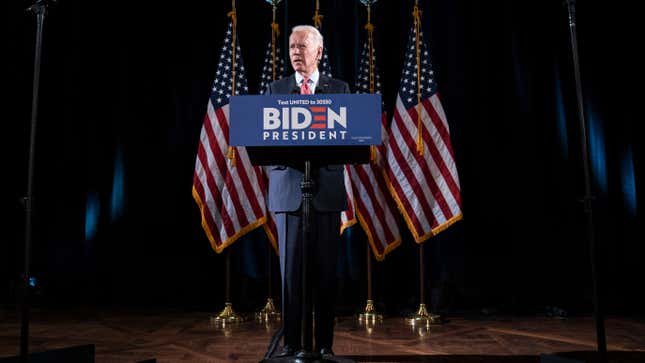Tara Reade's Allegations Deserve More Care
Latest
Image: Getty
On March 25, writer and comedian Katie Halper released a seven-minute excerpt from a forthcoming episode of her podcast, The Katie Halper Show, in which former Joe Biden staffer Tara Reade alleges that in 1993, Biden sexually assaulted her in the workplace. In the clip, Reade tearfully says Biden pinned her against a wall, put his hands under her skirt, and penetrated her with his fingers before telling her “You’re nothing to me,” twice. The next day, Halper released the full, hour-long interview on her personal SoundCloud account. Reade’s new allegations are a significant expansion of an interview she gave last year when she told a local Nevada County, California news outlet that during her time working for Biden, he had frequently invaded her personal space, once even stroking her neck in front of interns. While Democratic frontrunner Biden has been accused of inappropriate behavior before—ranging from sniffing a Nevada assemblywoman’s hair to rubbing noses with a woman at a fundraiser—he’s never been accused of sexual assault.
But while the hashtag #IBelieveTaraReade trended on Twitter and right-wing news sites have picked up the story, bigger outlets have been mostly silent. The silence has left many on social media wondering why the media largely seems to be ignoring an assault accusation against the Democratic frontrunner for president, especially when so much press has been devoted to so many other allegations of sexual misconduct aimed at powerful politicians, including our own president. Online, there’s speculation from the right and the far-left that Reade’s story has been deliberately ignored by the media, reluctant to publish anything that will hurt Biden’s chances in the 2020 election.
In reality, it’s very difficult to get even meticulously investigated sexual assault reporting published. Sometimes these stories get buried because media executives are loyal to men accused of sexual assault, but even when that’s not the case, there are always legal and financial risks associated with publishing accounts of sexual assault. NBC executives originally tried to kill Ronan Farrow’s reporting on the sexual assault allegations against Harvey Weinstein, reporting that would eventually help get Weinstein convicted on rape charges and win Farrow a Pulitzer. In the case of Weinstein, hesitation to print sexual assault allegations was perhaps tied up in executives’ personal connections to Weinstein. But even without those connections, powerful, wealthy people are often litigious, and news outlets can be wary of publishing credible accounts without an exhaustive investigation. Despite having eyewitness accounts and multiple corroborating sources, journalist and former Jezebel writer Irin Carmon wrote about her difficulty in publishing a story in the Washington Post involving sexual harassment allegations towards former CBS This Morning anchor Charlie Rose and sexual assault allegations towards former CBS executive Jeff Fager. The difficulties arose not only from the close relationship between the Post and CBS but also because of the teams of attorneys working to keep these reports from ever seeing publication, no matter how well-documented and rigorous the reporting.
-

-

-

-

-

-

-

-

-

-

-

-

-

-

-

-

-

-

-

-

-

-

-

-

-

-

-

-

-

-

-

-

-

-

-

-

-

-

-

-








































